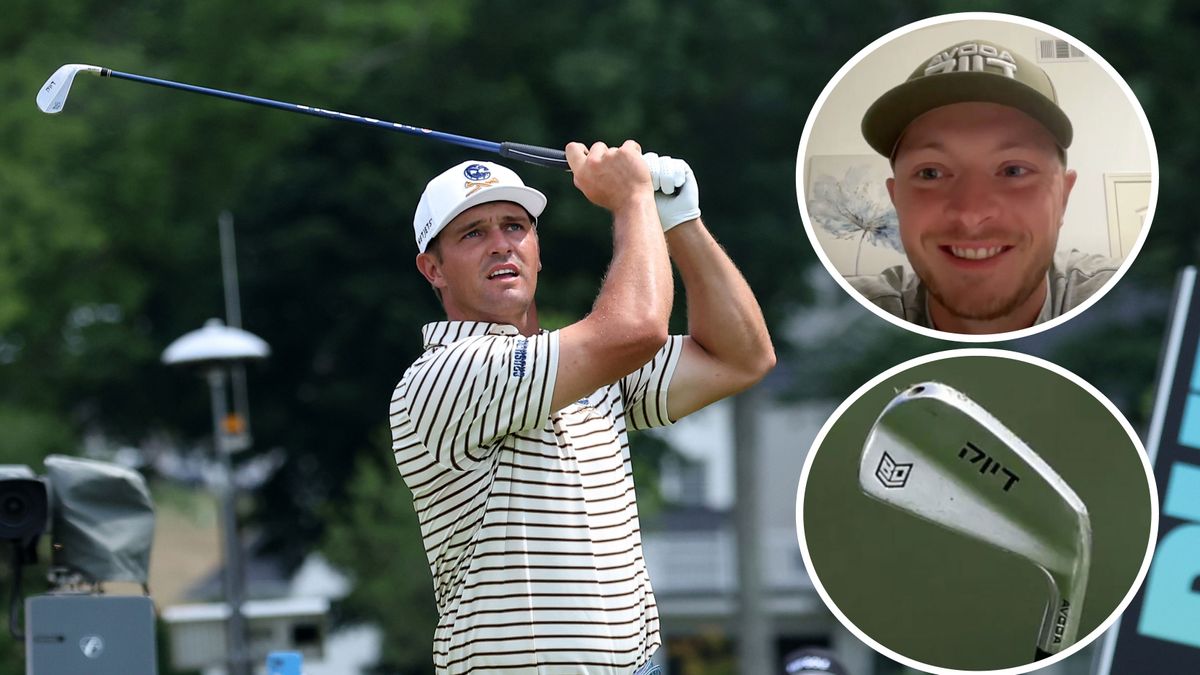‘Yeah, I just wanted to make myself a set of golf clubs a year ago and I got a bit carried away!” explains Tom Bailey, founder of Avoda Golf.
Bailey left college in the US in 2017 to pursue his playing career full-time but suffered some frustrating and recurring back injuries – which he “dived down a lot of rabbit holes” to try and fix, figuring out a lot of technical reasons for his ailments within his golf swing.
“A lot of people wanted to know what I did because there are a lot of people struggling with some of the same problems, and they aren’t getting any kind of results or getting better and ending up having to kind of quit the game even at a high level because of it, so that led me into the coaching world by accident.”
(Image credit: tombaileygolf.co.uk)
During this period, Bailey began looking more into Bryson Dechambeau’s golf swing and his game in general.
“From a swing point of view, some things I’ve learned about myself built the way I move. I’ve got a lot more of a swing type that would align with someone like Bryson. I’d been watching a lot of his stuff. What is he doing with his equipment? What does he do with his swing? It is obviously very different to everyone else, but it’s clearly working. So I figured ‘right, let’s go down the single-length golf club rabbit hole’ – that would have been 2021.”
Bailey’s curiosity got the better of him and he decided to explore the equipment side of the game even further.
“I built myself up some stuff in the UK and then got in touch with Mike Schy, Bryson’s long-time coach – that was during the Covid restrictions… We were working online for a while and just calling every week, talking about getting some stuff built up and just waiting for those restrictions to lift so that I could travel out to the States and spend some time with him.
At the beginning of January 2022, I could finally travel, so jumped on a flight and came out to California to Mike’s Academy in Fresno. My intention was to come out here for one month. Two-and-a-half years later, I’m still here.”
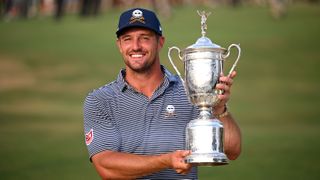
(Image credit: Getty Images)
Spending time at Schy’s Academy led to some further equipment exploration, with Bailey in search of the perfect iron setup for his own game. He spent time grinding heads and experimenting with different lengths in the same tent on the Academy range in which Bryson and Schy created Dechambeau’s first-ever one-length set.
Eventually, Bailey found a point where he was comfortable, and the beginnings of the Avoda combo-length irons were born. Essentially, these are single-length to a certain point in the set and will lengthen where necessary for an individual’s swing speed and type.
“The point where someone goes from that same length into a variable length set will be dependent on speed and how they deliver the club,’ said Bailey.
“So someone might benefit from a single length up to a 9-iron, but then they see that the 8-iron performance starts to drop off and they need the extra help so they may go half an inch longer from the 8-iron up to the 4-iron.
“Someone may be able to go all the way through to the 6, 7, or even the 5-iron, and then they just need that little bit of extra help on the 4-iron and you can go a little bit longer there.”
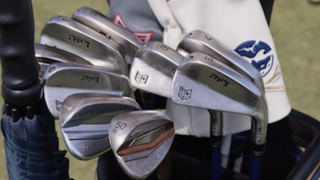
(Image credit: GolfWRX)
Bailey’s somewhat agricultural-looking set of homemade clubs began to attract attention from fellow competitors and range users, and soon the requests started coming.
“We got to a point where people wanted to do the stuff I was doing with their sets as well. So it’s like, we can take your set and grind them to pieces and it’s gonna look bad, but you’re going to like the performance, or I can come up with a solution.”
Bailey then turned to his brother Nicholas who was working in the firearms industry at the time, and they set about trying to find a company that would be able to build up some “presentable” prototypes.
However, they were met with a lot of initial knock-backs as almost everyone declined to collaborate and repeatedly uttered the line: “It’s not a product for the mass consumer.”
Bailey, however, was not deterred.
“I was like, ‘that’s great but can we just build it and I can play it, and if other people like it maybe it will become that?’ Eventually, we found someone that was happy to work with us on it.”
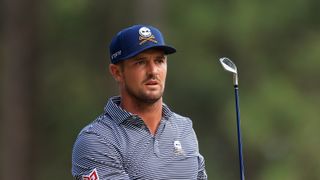
(Image credit: Getty Images)
Pretty soon, the first order for an initial 50 sets was placed and Avoda Golf was born. Little did Bailey know, however, that the fledgling company was about to experience a marketing miracle that most could only dream of. Enter one Bryson James Aldrich Dechambeau…
“The link-up with Bryson would have been September. I mean, I’ve known him for a few years just because being out at Mike’s, he was coming by practicing when he was in town.
“At this point, he came by early September, I want to say, and this is after his amazing golf, 58, and everything. He had his new drivers in the bag, but he’d been messaging every day – ‘Mike, hey, I need irons! The woods are great. Driver’s great. The Krank stuff is excellent but the irons aren’t working now.’”
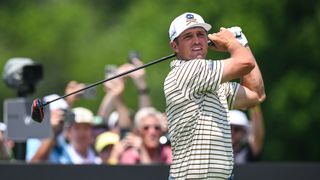
(Image credit: Getty Images)
At this point in proceedings, Schy wasn’t aware that Bailey was building golf clubs at all but had become interested in the idea of an iron set with bulge on the face.
“So Mike grabs a head and starts trying to grind some bulge into it. He got a good amount of curvature. It wasn’t the perfect smooth curvature but it definitely had some roll-off on the toe. It’s difficult to get on the heel because the hosel is in the way, but he went back out hit it, and straight away noticed that it was better.”
Sensing an opportunity, Bailey explained to Schy that he had begun manufacturing some irons and offered his services.
“I said: ‘Why don’t we have a go at doing something for Bryson?’ Mike said ‘let’s do it, what’s the worst thing that can happen?’ We started the Prototype with a forged head, one-piece forging CNC. We went with a CNC so we could get the bulge exactly where he wanted to get the accuracy on that.”
After presenting some early prototypes, Dechambeau was intrigued and gave his initial feedback.
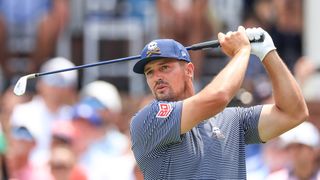
(Image credit: Getty Images)
“He had a specific look he wanted from the head profiled, and when you’re using a one-piece forging, if you want to see a thicker top line and a wider blade you’re not going to see it without it getting really heavy. He had a specific weight requirement, he needs to be at 275 grams. So I said, ‘if I’m gonna get the blade length and top line you want, we have to go hollow body, we have no choice there.’ Luckily, he was fine with it and, actually, it added some benefits of the spin rate coming down.”
So it was back to the drawing board for Bailey and Avoda.
“The head came back to him, he looked at it and went ‘OK, we need to change this and this’, so we went away again, did the design work, and got the heads made up. That next set of irons came in a couple of weeks before the Masters, the week before Miami, and myself and Mike went down to Dallas, got him testing the heads out and we were like, ‘Yeah, these are good, there could be something to this.’”
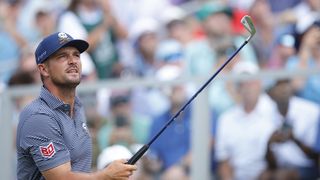
(Image credit: Getty Images)
Despite obviously being excited by the project and getting to work with Dechambeau, Bailey thought they were still at the very early stages of a design project, with many prototypes and back and forths yet to come before there was even a chance of anything going in a Major champion’s bag. It became apparent how wrong he was when a call came in on the Monday afternoon of The Masters.
“So, I don’t know, Monday, three or four in the afternoon, we’re out at the Academy. Connor, Bryson’s manager calls and goes: ‘right, we’ve got just over half a set good to go. We need the other set of irons here right now!’ I’m like, ‘I’m on the west coast in California. 4:30 on Monday afternoon. You guys are in Augusta on the east coast. I don’t think these irons are going to get to you until Wednesday, even if I take them right now?’”
Fortunately for Bailey and DeChambeau, a very helpful UPS worker who just happened to be a golf fan noticed the Augusta National shipping label and – with a little persuasion – managed to get the irons on a last-minute shipment just before the truck left the depot. The rest, as they say, is history.
The irons arrived on Tuesday morning and, little more than 48 hours later, Dechambeau had signed for a first-round 65 with the golfing world desperate to know more about these new mystery irons.
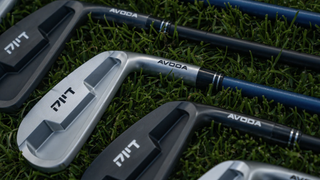
(Image credit: Avoda Golf)
All of this interest and some recent comments from Dechambeau himself beg the question ‘are these bulge face irons coming to retail?’
Bailey said: “It’s an interesting one as his set is so unique. It is specifically designed for him. But as he says they’re a one-of-one set. As far as bringing his model to retail, I believe in the custom fitting approach. I want my company to be about delivering the right product for the person. That means testing it and not just offering a product that’s in the middle for everyone.
“We are in the process of setting up with a lot of fitting locations that we’re opening accounts with here in the next few weeks with a huge demand from people. I do believe that there is a place for it (bulge) on golf clubs. It’s just got to be done in the right way. I’m not just going to slap it on a golf club and in a month or two’s time be able to go – ‘Hey, you can buy these golf clubs now.’ If I wouldn’t use it, I’m not going to sell it to someone, and that is the truth.
“When I got into this, my intention was to make myself a set of golf clubs and keep creating better equipment for myself. That’s not going to change. I still want to play golf. That’s why I set out to do this. There’s some stuff in the pipeline, that’s for sure. But when it’s available, it’ll be right for the person that’s using it.”

